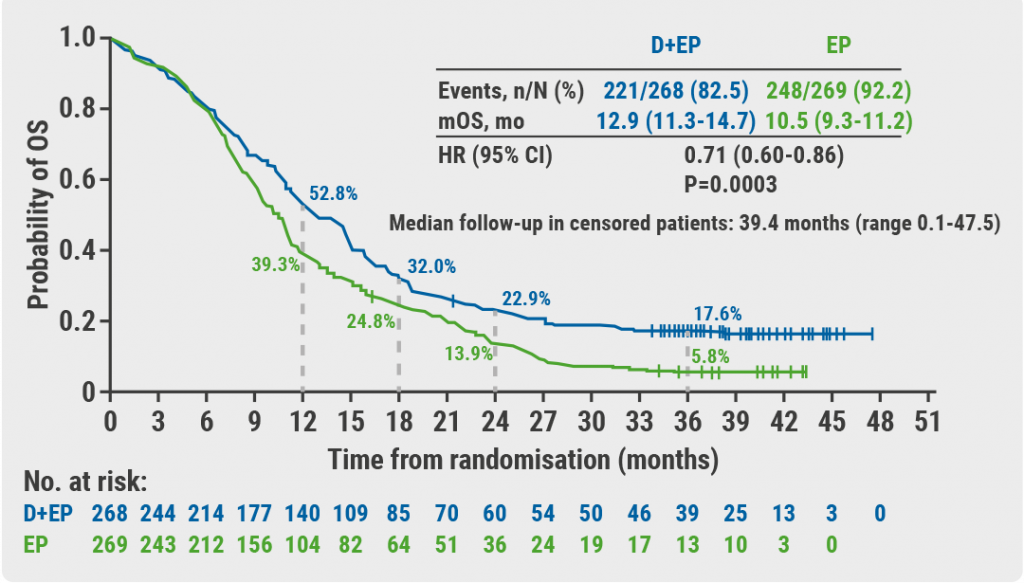Treatment with tebentafusp, a novel bispecific fusion protein that targets gp100 and activates T cells, has been shown to reduces the risk of death from metastatic uveal melanoma at 14 months by half, compared with available treatments [1]. However, OS was improved in patients regardless of RECIST best response, suggesting better surrogate efficacy endpoints are needed.
In the IMCgp100-202 trial (NCT02570308), 127 patients with metastatic uveal melanoma were treated weekly with tebentafusp in second line. RECIST was assessed and serum samples (n=118) collected at baseline, week 5, and week 9 were analysed for ctDNA. Dr Alexander Shoushtari (Memorial Sloan Kettering Cancer Center, NY, USA) presented the results [2].
Levels of ctDNA were associated with tumour burden at baseline. At 9 weeks, ctDNA was reduced in 70% of patients on tebentafusp, despite a RECIST response rate of only <10%. ctDNA reduction was strongly associated with improved OS, even in patients with RECIST progressive disease or stable disease. OS rate at 1 year was 100% for patients with ctDNA clearance (n=14) versus 57% for patients with ctDNA not cleared. Best overall response among those with ctDNA clearance was progressive disease in 4 (29%), stable disease in 8 (57%), and partial response in 1 (7%); 1 patient was not evaluable.
Dr Shoushtari concluded that “early ctDNA reduction may be a better surrogate of tebentafusp efficacy than RECIST objective response in patients with metastatic uveal melanoma.”
- Piperno-Neumann S, et al. Cancer Res 2021; 81 (Suppl), CT002.
- Shoushtari AN, et al. Early reduction in ctDNA, regardless of best RECIST response, is associated with overall survival (OS) on tebentafusp in previously treated metastatic uveal melanoma (mUM) patients. Abstract 1757O, ESMO Congress 2021, 16–21 September.
Copyright ©2021 Medicom Medical Publishers
Posted on
Previous Article
« Gut microbiota as a potential predictive biomarker Next Article
Tetraspecific ANKETs harnesses innate immunity in cancer therapies »
« Gut microbiota as a potential predictive biomarker Next Article
Tetraspecific ANKETs harnesses innate immunity in cancer therapies »
Table of Contents: ESMO 2021
Featured articles
Breast Cancer
Trastuzumab deruxtecan triples PFS
Novel conjugate meets primary endpoint
Longest survival benefit from first-line CDK4/6 inhibitor
Meta-analysis shows 6-months adjuvant trastuzumab is optimal
Double-positive results for triple-negative metastatic breast cancer
Survival after neoadjuvant therapy with trastuzumab-lapatinib plus chemotherapy
Postmenopausal breast cancer: extended letrozole reduces recurrence
Asian women also benefit from palbociclib plus letrozole
No PEARLs of survival with palbociclib plus endocrine therapy compared with capecitabine, but QoL better
Gastrointestinal Cancer
Neoadjuvant chemotherapy potential alternative to neoadjuvant chemoradiotherapy in LARC
Immune chemo-sensitisation looks promising in microsatellite-stable mCRC
Adagrasib shows promising clinical activity in heavily pretreated KRAS-mutated CRC
Automated detection of microsatellite status on unstained samples in early colon cancer
Consistent benefit of anti-PD-1 therapy for oesophageal and gastric cancer
HIPEC in gastric cancer with peritoneal metastases
ctDNA highly predictive in HER2-positive, advanced gastric or gastro-oesophageal junction cancer
Lung Cancer
Robust anticancer activity of trastuzumab deruxtecan in HER2-mutated NSCLC
Nivolumab/ipilimumab continues to provide survival benefit in unresectable MPM
Adjuvant atezolizumab lowers relapse rate in resected NSCLC
Three-year OS follow-up from CASPIAN trial
TCR clonality predicts pembrolizumab response in NSCLC
Melanoma
Adjuvant immunotherapy reduces risk of disease recurrence in stage II melanoma
IFN-γ signature predicts response to immunotherapy
Updated results of SECOMBIT trial
Combining T-VEC and pembrolizumab does not significantly improve survival in advanced, unresectable melanoma
Durable intracranial responses with nivolumab/ipilimumab
Genitourinary Cancer
TKI drug-free interval strategy not detrimental to conventional continuation strategy in RCC
Modified ipilimumab schedule reduces risk of grade 3/4 adverse events
Optimal neoadjuvant dose ipilimumab/nivolumab in stage III urothelial cancer
Better survival with neoadjuvant dose-dense MVAC regimen in MIBC
PARP inhibitor rechallenge improves PFS in ovarian cancer
Pembrolizumab prolongs survival in persistent, recurrent, or metastatic cervical cancer
Pembrolizumab has durable effect in previously treated MSI-H/dMMR advanced endometrial cancer
HRR mutational status is prognostic and predictive biomarker olaparib activity
Haematological Cancer
Mutational analyses are predictive in malignant lymphomas
Low numbers of M2 macrophages in tumour microenvironment associated with superior response to immunotherapy in Hodgkin lymphoma
COVID-19
Adequate response to SARS-CoV-2 vaccine in cancer patients
Cancer patients more likely to die from COVID-19 when hospital admittance is required
Third global survey of the ESMO Resilience Task Force
High COVID-19 mortality in Swiss cancer patients
Basic Science & Translational Research
Neutrophils negatively correlate with response to anti-PD-1 monotherapy in dMMR tumours
Tetraspecific ANKETs harnesses innate immunity in cancer therapies
Early ctDNA reduction in metastatic uveal melanoma correlates better with OS than RECIST response
Gut microbiota as a potential predictive biomarker
Related Articles
November 19, 2021
Mutational analyses are predictive in malignant lymphomas

November 19, 2021
Three-year OS follow-up from CASPIAN trial
© 2024 Medicom Medical Publishers. All rights reserved. Terms and Conditions | Privacy Policy

